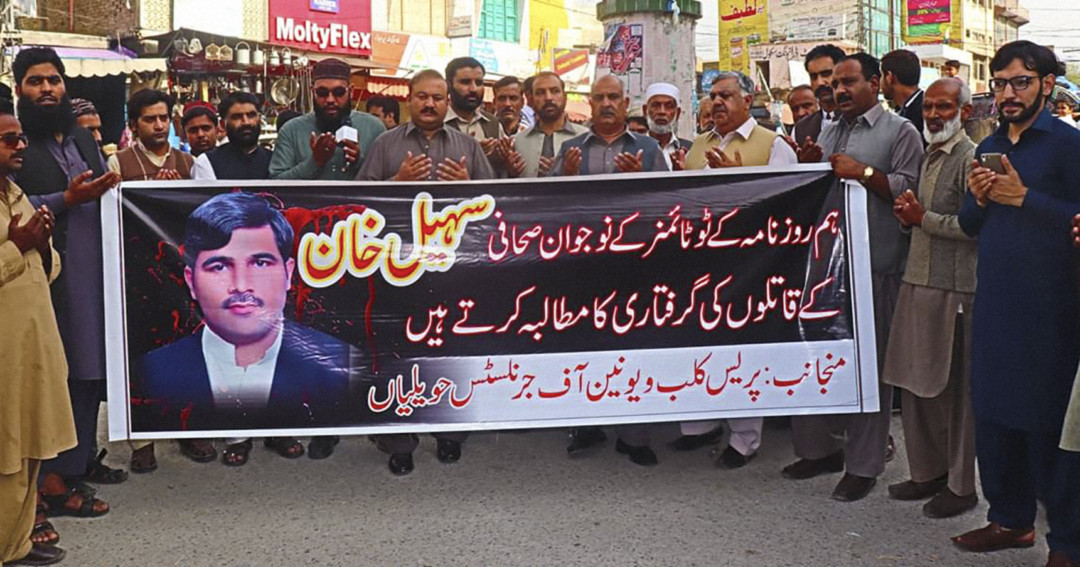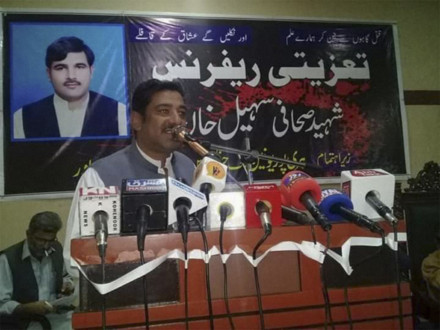16 October 2018
Haripur, Pakistan
Muhammad Khan
Profession
Media
Motive
Exposure of illegal activity


Adolfo Olivas


Ahmed Divela


Amit Jethwa


Artan Cuku


Babita Deokaran


Bayo Ohu


Berta Cáceres


Bhupendra Veera


Bill Kayong


Boris Nemtsov


Boško Buha


Chai Boonthonglek


Charl Kinnear


Chut Wutty


Chynybek Aliev


Cihan Hayirsevener


Daphne Caruana Galizia


Darío Fernández


Derk Wiersum


Deyda Hydara


Édgar Quintero


Edmore Ndou


Edwin Dagua


Federico Del Prete


Fernando Villavicencio


Gezahegn Gebremeskel


Gilles Cistac


Habibur Mondal


Igor Alexandrov


Jacob Juma


Ján Kuciak


Javier Valdez


Joannah Stutchbury


José Ángel Flores


Jules Koum Koum


Kem Ley


Luis Marroquín


Mahamudo Amurane


Marcelo Rivera


María Elena Ferral Hernández


Marielle Franco


Milan Pantić


Milan Vukelić


Muhammad Khan


Nelson García


Nihal Perera


Oliver Ivanović


Orel Sambrano


Perween Rahman


Peter R. de Vries


Rajendra Singh


Salim Kancil


Sandeep Sharma


Sikhosiphi Radebe


Slaviša Krunić


Soe Moe Tun


Victor Mabunda


Virgil Săhleanu


Wayne Lotter


Yuniol Ramírez


Zezico Guajajara
16 October 2018
Haripur, Pakistan
Profession
Media
Motive
Exposure of illegal activity
On the afternoon of 16 October 2018, a body was discovered in the Hattar industrial area in the Haripur district of Khyber Pakhtunkhwa, northern Pakistan. Police identified the deceased as 30-year-old Muhammad Sohail Khan, a journalist with the local Urdu newspaper Kay-2.
Khan had been travelling home from the police station, where he had just registered a complaint about threats he had been receiving from local drug dealers, and asked for protection, when he was attacked in broad daylight by two unidentified gunmen on motorbikes. According to the results of the police investigation, Khan was shot nine times – in the head, chest and shoulder – with a 9 mm pistol; he died on the spot.
Ali Jadoon, a police officer who accompanied Khan home from the police station that day, had waited at a local hostel while the journalist made a detour to drop off some school kids he had given a lift to. Jadoon recalled, ‘When [Khan] was coming back to me, I heard nine shots. He was gunned down some 500 metres away from me.’
Khan had been campaigning against Haripur’s dangerous drug mafia for five years before he was killed. He had been relentless in exposing the syndicate and their activities in his reporting on the local illicit-narcotics trade, despite immense pressure on him to stop.
At the time of his murder, the region’s illicit-drugs trade was flourishing, and its commodities were becoming as easily available as any legal goods. The Haripur police department had recently made some progress in combating the trade, with the arrest of Mussarat Iqbal, a formidable drug lord whose domain and exploits had been the subject of Khan’s fearless media campaign. Interestingly, the two were related: Iqbal was Khan’s uncle.
Iqbal’s two sons – Khan’s cousins – Hamayun Iqbal and Ali Sher, were revealed to have orchestrated the murder. To avenge their father’s arrest, which they blamed on Khan’s reporting, the two had organized for the courageous and motivated journalist to be assassinated the following day.
On 17 October, the day after the murder, police issued arrest warrants for the two men, themselves notorious drug dealers. Hamayun Iqbal and Ali Sher, who had gone on the run, were charged with murder by the Haripur police, and tracked down and arrested within a week of Khan’s death. Hamayun Iqbal was arrested on 24 October in Chaman; Ali Sher was apprehended in Karachi two days later.
They are currently awaiting trial. However, being relatives of Khan’s, they are negotiating an agreement that would involve the payment of blood money to the murder victim’s family in exchange for their pardon. This provision in the law is prevalent in Pakistan, where local village councils frequently settle disputes through consensus from all the parties involved.
A week before Khan was murdered, Mussarat Iqbal had threatened him directly, warning him to stop reporting about the drugs trade and the family’s illicit activities or face the direst of consequences. According to Khan’s brother, Farrukh Shahzad, the mafia had tried to buy the journalist’s silence, offering him US$1 000 a month in exchange for keeping quiet about the particular issue of drugs being sold to the area’s youth. ‘Hashish and heroin were common drugs among the youth and were sold very cheap, at around 20 cents per cigarette. They were easily available,’ Shahzad revealed.
Said Shahzad: ‘People in our area used to warn me of their fears, that Sohail Khan was fighting a loner’s fight against a very powerful and entrenched drug mafia, and that my brother, with all his will and desire, was no match, and actually they would advise me to ask him to give up his fearless reporting against the drug mafia.’

Fellow journalists protest and pray for Khan

An event organized in Khan's memory by the Haripur press club
Khan’s wife, Asma Bibi, had also on several occasions pleaded with him to stop reporting on these brutal drug lords with their extensive network. But the two were often at loggerheads over the issue.’He fought the tough battle all alone, against the strong mafia. I told him to think of our two young kids: “Why are you bringing risk and peril to your own and your family’s lives?” But he never listened to me,’ said Bibi. She is now living with her parents and fears for the safety of their school-going son and daughter.
Hattar is an industrial area where many businesspeople from Punjab province and certain tribal areas have become patrons of the illicit-narcotics business. These men are largely responsible for Hattar’s pervasive drugs problem, and the social and health costs it has for the community. Khan’s fearless and persistent attempts to take it on, through his reporting, and his efforts to educate the public and enlighten the local administration about how to respond to the mafia, has had a notable impact posthumously: the community believes Khan’s fight through his pen has created awareness and a desire to tackle the problem in Haripur.
The news of Khan’s murder, and the reasons behind it, sparked outrage across Pakistan and led to the staging of nationwide protests and rallies calling for justice for the slain journalist. Participation was widespread and included members of journalist unions and international press-freedom bodies, as well as civil-society activists and ordinary citizens.
Khan’s contributions are today appreciated and praised by people from every walk of life: notables, commoners, journalists, teachers and social activists. Among them is Waqas Ali, a university student, who, nearly a year after Khan’s death, still becomes emotional when speaking about the man he never met: ‘He was a great man who fought for a cause, who saved lives of many young people from the deadly drugs they were addicted to.’
Zakir Tanoli, president of the Haripur press club and a colleague of Khan’s, recalled that despite having received many grave and serious threats, Khan had not held back on reporting on the activities of the local drug mafia and had essentially sacrificed his life to protect society from their menace.


20 July 2010
Gandhinagar, India
Amit Jethwa


15 October 2016
Mumbai, India
Bhupendra Veera


21 June 2016
Sarawak, Malaysia
Bill Kayong


11 February 2015
Klong Sai Pattana, Thailand
Chai Boonthonglek


26 April 2012
Koh Kong, Cambodia
Chut Wutty


5 May 2004
Bishkek, Kyrgyzstan
Chynybek Aliev


20 August 2000
Dhaka, Bangladesh
Habibur Mondal


10 July 2016
Phnom Penh, Cambodia
Kem Ley


5 July 2013
Deraniyagala, Sri Lanka
Nihal Perera


13 March 2013
Karachi, Pakistan
Perween Rahman


19 June 2018
India
Rajendra Singh


26 September 2015
Selok Awar-Awar, East Java, Indonesia
Salim Kancil


24 March 2018
Bhind, Madhya Pradesh, India
Sandeep Sharma


13 December 2016
Monywa, Myanmar
Soe Moe Tun